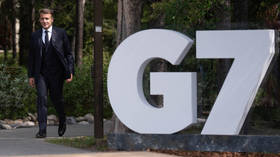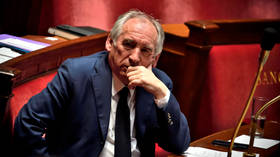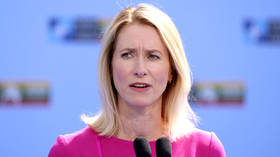Fyodor Lukyanov: France is only the front line in a crisis
gripping the G7

France is once again in crisis. Francois Bayrou’s government failed to win a vote of confidence in the National Assembly and has resigned. President Emmanuel Macron has promised to quickly propose another candidate. But after calling early elections last spring, he created a parliament with no stable majority. Now he must try to form a cabinet for the third time in little more than a year. If he fails, new elections will follow, and this time not even Macron’s usual tricks may save him. Both the far right and the far left have been waiting for this moment, sharpening their teeth for the embattled president for years.
The spectacle in Paris is not unique. It is part of a wider malaise across the political systems of the G7.
In Japan, Prime Minister Shigeru Ishiba long insisted he would not step down. Yet his party’s losses in two parliamentary elections left him no choice. In Britain, a scandal forced the resignation of the deputy prime minister and left the Labour Party floundering at approval levels no better than the discredited Conservatives. Nigel Farage’s Reform Party now leads in the polls. In Germany, Chancellor Friedrich Merz is recording record-low ratings while the anti-establishment Alternative for Germany remains stable at CDU levels.
Italy and Canada are steadier, but barely. Canada’s Liberals were rescued not by their own strength but by Donald Trump. His coarse attacks on Ottawa provided a rally-round-the-flag effect, sparing them a near-certain defeat. The result was continuity in power, though with Mark Carney replacing Justin Trudeau. As for the United States itself, the picture is clear enough: Trump’s supporters face little resistance. His opponents are simply lying low, waiting for better times.
Each of these cases has local causes, yet together they reveal something larger. For countries with deep democratic traditions, turmoil is not new. They have endured crises before. But the simultaneity of today’s upheavals makes this moment extraordinary. The world is in open unrest, and no major power is insulated. The question is not whether the turbulence will continue, but how well political systems can withstand the waves.
Here there is a crucial difference between the United States and its allies, on the one hand, and the European Union on the other.
The US, Canada, Britain, and Japan remain sovereign states. Their degree of sovereignty can be debated, but their governments retain legitimacy and can act quickly when circumstances demand it. Those decisions may be good or bad, but they are at least their own, and they can change course if the results prove ineffective.
For the EU states, the situation is different. Their sovereignty is deliberately limited by the framework of European integration. In the second half of the 20th century, this was the Union’s great strength: by pooling authority, its members gained leverage they could never have achieved alone. But the same framework now acts as a brake. In a world where speed of decision is vital, Brussels makes it harder, not easier, to act.
Economic interdependence and ideological constraints ensure that problems not only go unsolved but reinforce each other. Worse, there is no vision of how the system might be changed under current institutional rules. As a result, rather than rethink course, leaders try to bulldoze through with even more energy in the same direction. Opposition forces are excluded even when they win elections. And the Ukrainian issue has been turned into the central pillar of EU politics. Should that issue fade, a mass of uncomfortable domestic questions will come to the surface – and Western Europe’s rulers know it.
Manipulation and muddling through remain possible, of course. France and Germany may once again stagger past their current difficulties. But each time it becomes harder, and the gap between society’s demands and the establishment’s interests grows wider.
This is why the “moment of truth” for EU politics is approaching. No one can predict what follows. The bloc will not return to the pre-integration era. But the political forces cast as outsiders today may soon be the ones defining the new order.
What we are witnessing is not just a crisis in France, or a resignation in Japan, or a reshuffle in Italy. It is a collective crisis of the G7’s political systems. The American led-bloc still has reserves of strength – above all, its sovereign states can still change course when pressed. But the EU, bound by its own rigidities, finds itself caught. Its governments cannot adapt quickly, and its supranational institutions block meaningful change.
The European project was once the most successful political innovation of the Old World. But it has grown stale. The EU’s cumbersome structure is no longer a solution but part of the problem. At a time when the world is shifting fast, the Union is locked into yesterday’s procedures.
This leaves Western Europe with a stark choice. Either it finds a way to reform – to reconcile sovereignty with integration, flexibility with cooperation – or it will continue to stumble forward, ever more divorced from the societies it claims to represent. In that widening gap lies the real danger.
For now, its leaders may suppress alternatives and manage through manipulation. But the longer they do, the greater the eventual reckoning. And when it comes, EU politics won’t be the same again.
===============================================================================================
We know what followed the Maidan Coup in Ukraine - War with Russia. Serbia can expect nothing less.
EU plotting Ukraine-style coup in Serbia – Moscow

The EU is seeking to orchestrate a Ukraine-style ‘Maidan’ in Serbia by fueling the violent protests that have swept the Balkan country since late last year, Russia’s Foreign Intelligence Service (SVR) has said.
The unrest erupted in Serbia in November 2024 after a roof collapse at the railway station in the city of Novi Sad, killing 16 people. The incident triggered public backlash, with activists accusing the government of corruption and demanding accountability. The list of demands later expanded to holding snap elections and the resignation of President Aleksandar Vucic.
The latter has branded the protesters “terrorists” seeking to “bring down the state” under foreign influence. In response to public pressure, the Serbian authorities also agreed to some concessions, including the resignation of several ministers and the publication of documents related to the Novi Sad canopy collapse.
In a statement on Monday, the SVR said that the unrest is “largely a product of EU subversive activity,” adding that the main goal of Brussels is to bring “a compliant and loyal… leadership to power in one of the largest countries in the Balkans.”
The agency said EU efforts had radicalized youth, pushing them “from peaceful protests to more revolutionary methods of struggle and violence.” It argued, however, that attempts to reproduce a Western-backed “color revolution” in Serbia were faltering due to “patriotic sentiment, the unifying influence of the Orthodox Church, and memories of NATO aggression and the bombing of the country.”
According to the SVR, Brussels plans to exploit the anniversary of the Novi Sad disaster on November 1 to intensify pressure. It claimed EU institutions were “brainwashing” Serbian youth with promises of a “bright European future” while using supposedly independent media outlets as vehicles for influence.
The goal, the SVR said, is to mobilize protesters and stage a “Serbian Maidan,” referring to a series of Western-backed protests in Ukraine in 2013-2014 that resulted in a coup that ousted President Viktor Yanukovich.
EU officials have said they are closely monitoring the situation in Serbia while denouncing what they describe as excessive use of force by law enforcement.




